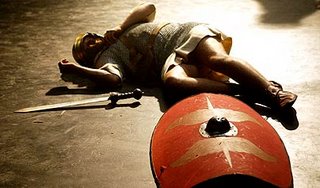LIFE AND DEATH IN ROME: Doom

This week we uncover how it all went wrong for the world’s first superpower. We see how after centuries of domination, barbarian tribes overturned Imperial power and seized control of Western civilization.
After 600 years as rulers of the world, the Roman Empire faced annihilation. At the start of Fifth Century even the ultimate city of Rome was besieged.
In 410 the Goths stormed Rome. The city that had once been the glorious capital of the Empire, the symbol of Roman supremacy was now in enemy hands. How could this happen?
We look at how inexperience, infighting and sheer incompetence undermined the Empire and how the army, once the flagship Roman institution, became so fractured and feeble that when enemies breached the frontiers they could not push the Goths back.
As Rome fell the Roman Legions were pulled out of Britain by the Emperor anxious to protect himself even if that meant dismantling the frontiers. The people who had once lived under Roman rule now had to look to their own defences as the barbarian tribes moved into Western Europe.
Everything the Roman Empire had brought to Europe still endured – the buildings, institutions, language, law and the Christian church, it was just modified and adopted.
This is the extraordinary tale of why Rome itself fell but how the idea of Rome endured. We will show how Roman Europe survived and evolved on its own terms, without the great city-state at its heart and how Rome lived on in the people who still aspired to be Roman and live as the Romans had, including the ‘barbarians.’
Our story moves between the great waning city of Rome and northernmost province of Britain. Rome on the brink of Barbarian domination and Britain, deserted by its soldiers but struggling on. There the elite hired Saxon bodyguards keep their peace until the guards turn on their Romano-British masters and began to conquer Britain.
Finally, we reveal the extraordinary story of Rome’s ultimate legacy to the Twenty-First Century.

0 Comments:
Post a Comment
<< Home